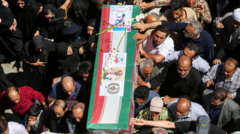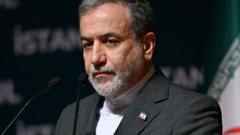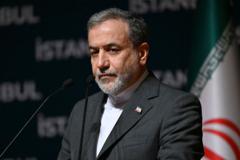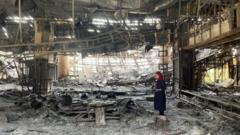**During a press conference, President Trump reaffirmed his readiness to bomb Iran again should evidence suggest significant uranium enrichment progress by the country, highlighting the precarious state of affairs.**
**Trump Expresses Openness to Renew Military Action Against Iran**

**Trump Expresses Openness to Renew Military Action Against Iran**
**In a recent White House briefing, President Trump indicated he would consider military strikes on Iran if necessary, amidst ongoing tensions.**
President Donald Trump has stated he is "absolutely" willing to contemplate military strikes against Iran once more. In an exchange with BBC's Nomia Iqbal during a White House press briefing, he asserted he would "without question" order attacks if intelligence determined that Iran could enrich uranium to dangerous levels.
Following a surge of conflict over the past week, the U.S. directly engaged in military actions against key Iranian nuclear facilities, deploying "bunker buster" bombs. Trump's comments come on the heels of Iran’s Supreme Leader, Ayatollah Ali Khamenei's remarks that the recent military strikes have yielded minimal significant results. However, Trump stood firm in his claims that the Iranian nuclear sites had been "obliterated."
In a post on his social media platform, Truth Social, Trump claimed to know the exact location of Ayatollah Khamenei's hiding spot during the conflict, suggesting he prevented coordinated strikes against the leader by U.S. and Israeli forces. Iranian officials, despite their leaders' rhetoric of victory, later conceded that significant damage had occurred to nuclear infrastructures as a result of the bombings.
Satellite imagery confirmed extensive damage to the Isfahan nuclear site, and Iran's foreign minister, Abbas Araghchi, acknowledged the severe effects of the U.S. and Israeli airstrikes. Despite these developments, Khamenei declared that the conflict with Israel had not hindered Iran's nuclear ambitions, stating the continuation of the program was unwavering.
In response, President Trump criticized Khamenei’s proclamations of victory, asserting that the so-called 'Supreme Leader' had made a false declaration. He claimed that he had also been negotiating on the potential easing of sanctions against Iran but abandoned this effort after Khamenei's hostile statements.
The violence escalated when Israel carried out targeted attacks on Iranian nuclear sites and military positions, resulting in the deaths of several nuclear scientists and military personnel. Israeli Prime Minister Benjamin Netanyahu warned that Iran, if left unchecked, could develop a nuclear weapon in a remarkably short timeframe.
In light of these heightened tensions, there have been discussions within the White House about various strategies to bring Iran back to diplomatic negotiations, including possible support for a civilian nuclear program strictly limited to non-enrichment purposes. However, Iran has denied any intention of recommencing nuclear negotiations with the U.S., despite Trump's claims at a NATO summit suggesting talks would resume next week.
The recent conflict has left a significant toll, with reports from Iran indicating 610 fatalities from the airstrikes, contrasted by 28 reported deaths in Israel. The ongoing situation continues to evolve, underscoring the tension between the U.S., Israel, and Iran's nuclear ambitions.
Following a surge of conflict over the past week, the U.S. directly engaged in military actions against key Iranian nuclear facilities, deploying "bunker buster" bombs. Trump's comments come on the heels of Iran’s Supreme Leader, Ayatollah Ali Khamenei's remarks that the recent military strikes have yielded minimal significant results. However, Trump stood firm in his claims that the Iranian nuclear sites had been "obliterated."
In a post on his social media platform, Truth Social, Trump claimed to know the exact location of Ayatollah Khamenei's hiding spot during the conflict, suggesting he prevented coordinated strikes against the leader by U.S. and Israeli forces. Iranian officials, despite their leaders' rhetoric of victory, later conceded that significant damage had occurred to nuclear infrastructures as a result of the bombings.
Satellite imagery confirmed extensive damage to the Isfahan nuclear site, and Iran's foreign minister, Abbas Araghchi, acknowledged the severe effects of the U.S. and Israeli airstrikes. Despite these developments, Khamenei declared that the conflict with Israel had not hindered Iran's nuclear ambitions, stating the continuation of the program was unwavering.
In response, President Trump criticized Khamenei’s proclamations of victory, asserting that the so-called 'Supreme Leader' had made a false declaration. He claimed that he had also been negotiating on the potential easing of sanctions against Iran but abandoned this effort after Khamenei's hostile statements.
The violence escalated when Israel carried out targeted attacks on Iranian nuclear sites and military positions, resulting in the deaths of several nuclear scientists and military personnel. Israeli Prime Minister Benjamin Netanyahu warned that Iran, if left unchecked, could develop a nuclear weapon in a remarkably short timeframe.
In light of these heightened tensions, there have been discussions within the White House about various strategies to bring Iran back to diplomatic negotiations, including possible support for a civilian nuclear program strictly limited to non-enrichment purposes. However, Iran has denied any intention of recommencing nuclear negotiations with the U.S., despite Trump's claims at a NATO summit suggesting talks would resume next week.
The recent conflict has left a significant toll, with reports from Iran indicating 610 fatalities from the airstrikes, contrasted by 28 reported deaths in Israel. The ongoing situation continues to evolve, underscoring the tension between the U.S., Israel, and Iran's nuclear ambitions.





















